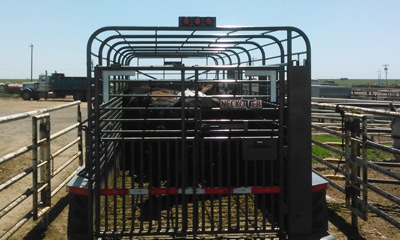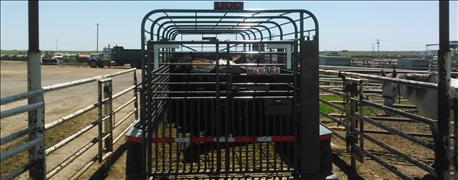
Soils judging teams from Indiana were in Oklahoma a few weeks ago to practice for and participate in the National Land and Range Judging Contest. I was there coaching a qualifying team as well. While the team spent plenty of time looking at soil, we also spent time soaking in the culture of a different part of the country.

CATTLE INSTEAD OF CORN: A rancher might base his livelihood on cattle, but he thinks much like any farmer thinks.
A side trip to the OKC West stockyards near Oklahoma City proved to be a gold mine for exposing Indiana teenagers to rural culture. After watching the auction action inside, we ventured outside to the open-pen area. A pickup truck pulled up with an open-air trailer and about 15 head of cattle. The man who got out and talked to us while he waited for someone to come check in the cattle looked like he could have been from Tipton or Terre Haute or Evansville. Instead, he was from El Reno, Okla.
“We run cattle on wheat pasture in the winter, and then take them off in March and sell them,” he said. “Until this year, it’s been profitable. Many of them come out of the Southwest, like from Texas, bought as feeders. This year the market tanked after most people bought them. There are people bringing cattle in here who will lose up to $300 per head vs. what they paid for them.”
Does that sound familiar? His tone of voice was familiar, too — concerned but far from defeated. “This is just my last few head of cattle,” he said. “We’ve already sold most of them. Usually, people buy them in big lots to fill semis. We try to bring in enough so guys can buy our cattle to do that until we get to the end.”
He didn’t bat an eye when talking about someone he knew who had to put up more land for collateral at the bank because he lost so much this winter. He could have been talking about someone who paid high cash rent and got hit with floods last year, plus low prices to boot.
“We will harvest the wheat — the cattle don’t hurt it,” he said. “The price of wheat went south, too, but we still need it for winter pasture.”
His whole livelihood isn’t confined to cattle. He and his brother raise 1,000 acres of hay. “We get five to six cuttings of alfalfa out there,” he says. Some of it is irrigated, but some of it isn’t.
“We have a long-standing dairy customer that buys most of it,” he said. “It’s a relationship that goes back more than a generation.”
Relationships are big in cattle country, just like they are important here in the Midwest.
He might have talked to us longer, but his cellphone rang. “Well, I’ve got to go meet the crop adjuster, guys,” he told me.
Sound familiar? Farmers meet with crop adjustors, too. Call him a rancher, but his challenges, his motivations, his ups and downs — any farmer knows them just as well.
About the Author(s)
You May Also Like




